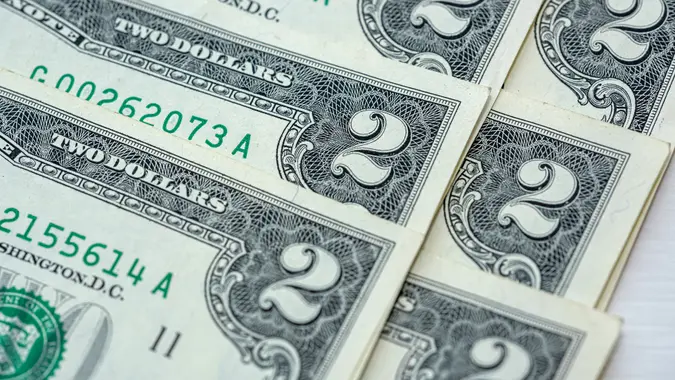6 Signs You’re Not as Good With Money as You Think

Commitment to Our Readers
GOBankingRates' editorial team is committed to bringing you unbiased reviews and information. We use data-driven methodologies to evaluate financial products and services - our reviews and ratings are not influenced by advertisers. You can read more about our editorial guidelines and our products and services review methodology.

20 Years
Helping You Live Richer

Reviewed
by Experts

Trusted by
Millions of Readers
Maybe you think you have your finances in order, but there are a few key signs that your money management skills leave something to be desired. Just because you aren’t overdrafting every week doesn’t mean there aren’t still some things you need to work on. Here’s how to tell you’re not great with money–and how to get better.
You Don’t Have a Budget
If you’re not keeping track of what you’re making and what you’re spending, you aren’t managing your money as well as you could be. Maybe you think budgeting is only for when you’re tight on cash, but the truth is that everyone should have a budget of some kind. Everyone has goals they want to achieve when it comes to money. Whether it’s a lavish vacation or paying off student loans, without a tracking system, you’re not going to be able to achieve your long-term money goals as efficiently. It’s also hard to correct any bad habits you have around money if you don’t know how you’re spending it. If you don’t have a budget, keep track of what you spend for a month. You can do this in a spreadsheet, or an app like Mint. Mint gives you personalized advice based on your spending, and monitors if regular expenses like subscriptions increase.
You Make a Lot of Impulse Buys
If you’re constantly online shopping and thinking “why not?” It’s time to rethink how you’re purchasing items. Once you make a budget, you’ll be able to see just how much you have for “fun” purchases, and you’ll feel better about shopping, rather than just buying something because you feel you have to have it, despite how much it costs. A good rule of the thumb is the 50/30/20 rule, where 50% of your income goes to necessities, 30% goes to spending money, and 20% goes to savings. Try to work this into your routine so those impulse buys aren’t cutting into other necessary expenses each month.
You Don’t Have Savings
Fearing a sudden expense is a sign that you don’t have any backup cash. Though there are situations where you might not be able to save as much as you can, if you do have the means, starting to save a certain amount from each paycheck is essential. The recommended amount of savings is three months of living expenses, but that can be a lot. Even saving $20 from each of your paychecks can be a huge boost so you don’t have anxiety anytime unexpected costs come up.
You Only Pay the Minimum Payment on Credit Cards
Credit card debt can add up quickly. The worst part is that, if you don’t pay off your balance at the end of the month, interest will start to pile up as well. Only making the minimum payments on your credit card bill ensures you will end up paying a lot more. You could end up paying thousands over your initial balance simply because of interest. If you can, try to pay off the entire balance of your credit card each month, or at least significantly more than minimum payment.
You’re Always Looking for an Easy Out
Maybe you’ve been struggling with credit card debt for years, so you’ve transferred your balance over and over again, only to watch it get bigger. Or you’re constantly explaining away why you’re not good with money: you’re young, your parents weren’t good with money, you live in an expensive city etc. Just like any other skill, getting better with money takes practice and commitment. If you’re not dedicated to getting better, you’re going to continue to be in the same financial situations you’ve always been. To get better, you have to make a promise to yourself that you’re going to set rules for yourself and follow them.
You Avoid Talking About Money
If you cringe every time anyone brings up money, it might be a sign that you think your monetary situation is something to be ashamed of. Think about why conversations about finances make you so anxious and then ask yourself how you can fix that. If it feels hopeless, consider a financial advisor. Though it’s an initial expense up front, an advisor can teach you skills for life that can help you feel more confident about your spending habits and control over your income.
More From GOBankingRates
- One-Third of People Have $100 or Less in Their Checking Accounts, Survey Shows — Here’s How Much Experts Say You Should Actually Have
- Find Out Which Banks Are the Top 100 Banks Leading the US in 2022
- 10 Simple Ways To Start Investing for Any Budget
- 35 Useless Expenses You Need To Slash From Your Budget Now
 Written by
Written by  Edited by
Edited by 

























